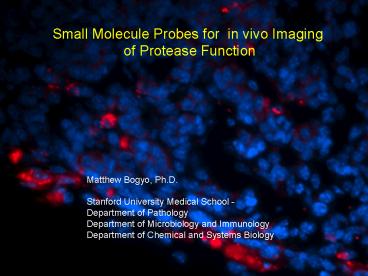Chemical methods for Dissecting Protease Function - PowerPoint PPT Presentation
1 / 22
Title:
Chemical methods for Dissecting Protease Function
Description:
Recently more complex mouse models have been tested ... Mike Blackman. Sharon Yeoh. Galia Blum. Alicia Berger. UVM. Gary Ward. Jeralyn Haraldsen ... – PowerPoint PPT presentation
Number of Views:88
Avg rating:3.0/5.0
Title: Chemical methods for Dissecting Protease Function
1
Small Molecule Probes for in vivo Imaging of
Protease Function
Matthew Bogyo, Ph.D. Stanford University Medical
School - Department of Pathology Department of
Microbiology and Immunology Department of
Chemical and Systems Biology
2
Overview
- Why Activity is Important
- Activity Based Probes (ABPs)
- What are they?
- How do they work?
- Applications of ABPs
- Biochemical profiling
- Caspases - Alicia Berger - Mol. Cell. 2006,
23509-521 - Imaging
- Cathepsins - Galia Blum
- Chemical Genetics
- Protease function in human parasites - Carolyn
Phillips, Shirin Kapur - Toxoplasma gondii
- Plasmodium falciparum
3
Activity Based Probes for Proteases
Peptide Substrate
4
Activity Based Probes for Proteases
Tag
Enz
AOMK
5
Cat K
Cat F
Cat C
Cruzain
Cat H
Cat S
Cat L
Papain
Cat V
Cat B
6
The qABP
GB11
GB111
GB17
GB117
7
Quenched Probe Strategy
8
Imaging in Live Cell Monolayers
Blum et al. Nature Chemical Biology, 2005, 1,
203-209
9
Stability of Probes
GB111
Serum (Hrs)
4
1
Inhibitor
97
66
42
36
Cat B
28
Cat L
Cat L
20
Non quenched
10
Cathepsins and Cancer
- Cathepsins have been linked to
- cancer progression
- Cathepsin B - mainly in cell
- culture models
- Recently more complex mouse models have been
tested - RIP-Tag - Joyce et al. (2004) Cancer Cell, 5,
443-453 - PyMT - study with cat B -/- mice - Vasiljeva et
al. (2006) Cancer Research, 66, 5242 - Angiogenesis model - Cathepsin L - Urbich et al.
(2005) Nature Medicine, 22, 206-213. - RIP-Tag/ Cat K/O - Joyce et al. (2006) Genes and
Development, 20, 543 - All support a role for cathepsins in tumor growth
and angiogenesis - Protease activity provided by tumor
microenvironment not just tumor cells
11
Multistage tumorigenesis in RIP-Tag transgenic
mice
12
Cathepsin activity profiling in vivo
Exocrine pancreas
Normal islet
Normal islet
x200
Fluorescent cathepsin probe
Fluor cathepsin probe/DAPI
Joyce et al. Cancer Cell (2004) 5, 443-53.
13
Need for NIRF probes
14
NIRF Probe and Control
GB123
Galia Blum
Georges von Degenfeld
15
Cathepsin Activity in Tumor Cell Lines
16
In vivo Imaging of Cathpsins
17
In vivo Imaging of Cathpsins
18
Need for NIRF probes
19
Imaging Drug Efficacy
Ki777
AMS28
Vehicle
Ki777
AMS28
Ki777
AMS28
Vehicle
x109
Tumor Fluorescence
Ki777
Vehicle
16
12
x109
p/sec/cm2/srX109
x109
8.0
4.0
0.0
Ki777
Vehicle
20
Quantification of Drug Efficacy
21
Conclusions
- Activity based probes can be used to monitor
protease ACTIVITY in complex proteomes - Quenched activity based probes allow real time
imaging of protease activation - Near Infrared fluorescent probes can be used to
monitor protease activity in live animals - Potential applications
- Diagnostic imaging - fluorescent, PET
- Pharmacodynamic studies
- Drug efficacy studies
22
Acknowledgements
The Bogyo Lab Galia Blum Daisuke Kato Steven
Verhelst Kelly Sexton Marko Fonovic Alicia
Berger Carolyn Phillips Shirin Arastu-Kapur Masoud
Sagadhiani Fang Yuan Beth Ponder Mark Rice
Stanford Georges von Degenfeld Helen Blau
The Burnham Guy Salvesen Jean Bernard Denalt
Sloane Kettering Johanna Joyce
Alicia Berger
UCSF Doug Hanahan Jessica Pahler
Compound Libraries James Powers Bill Rousch
NIMR Mill Hill Mike Blackman Sharon Yeoh
Shirin Arastu-Kapur
Carolyn Phillips
Beth Ponder
UVM Gary Ward Jeralyn Haraldsen
http//bogyolab.stanford.edu
Funding Department of Defense - BCCOE, Sandler
Family, Searle Scholars Fellowship, NIH Roadmaps
NTCNP Grant, Burroughs Wellcome Fund, NIH PPG































